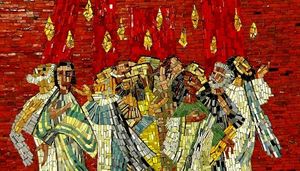
As our dioceses and parishes implement more fully the Rite of Christian Initiation of Adults for all those who have reached the age of discretion (aka the age of reason), parents sometimes have difficulty understanding why their child would be confirmed at age seven or eight. It is important for all of us to understand the pastoral theology of and catechesis for the sacraments of initiation, especially Confirmation.
During the apostolic times and through the first thousand or so years of Christianity, the three sacraments of initiation—Baptism, Confirmation, and Eucharist—had been celebrated in conjunction with each other. Over the course of history, the reception of the three were separated, and in some places were celebrated “out of order.” A pastoral theology and catechesis developed around each sacrament based more on the age of the person receiving the sacrament than on the actual theological foundation.
Life after initiation
Eventually, Confirmation began to be thought of as a sacrament that required a higher level of intellectual and spiritual maturity than the other initiation sacraments. This was never the official teaching of the church, but it has been embedded in the thinking of many parents and many pastoral leaders
In addition, as the celebration of the sacraments were separated, parents began to entrust the catechetical formation of their children to others. The religious formation of children increasingly became the responsibility of the priests, brothers, sisters, and Catholic schools. Then, as the number of ministry professionals began to drop and as parents began to feel less and less qualified to teach the faith to their children, lifelong, comprehensive faith formation began to decline.
Today, many parishes focus only on “sacrament preparation” rather than continuing faith formation or “religious education” for children and teens not enrolled in Catholic schools. The formation classes for children and parents revolve around preparation for sacraments, and perhaps some classes after reception.
The “Now I’ve prepared and received, so I’m done with classes until I need the next sacrament” mentality is prevalent. It seems almost a cultural expectation that first and second grade children prepare for reconciliation and first communion, then pause faith formation until it is time to prepare for Confirmation when they become teenagers. The teens preparing for Confirmation have typically not been involved in faith formation since their first communion classes.
In addition, parish life suffers from a huge deficit of adult faith formation, even parent involvement in the faith formation of their children. Catechesis of parents, sponsors, and godparents—and sometimes grandparents—is so essential. Family catechesis is an important step that seems to be happening in more and more parishes. It touches the tip of the iceberg of parent-and-child faith formation and can form a wonderful basis for adult education as well.
A robust, comprehensive family faith formation would need to emphasize the gifts and role of the Holy Spirit, rather than the age of those preparing to receive the sacrament. Understanding that Confirmation gives the fullness of the gift of the Holy Spirit doesn’t mean it concludes the formation and learning of our faith.
Connected to the community
When unbaptized children of catechetical age are initiated, they celebrate all three sacraments of initiation in a single liturgy. To be enriched by the Holy Spirit from as early as possible is a great grace. We should not deny them that grace based on a misunderstanding of Confirmation as a maturity sacrament.
Changing the paradigm and expectations of parish religious education ministry is a huge uphill struggle. It takes a long time of small steps to help families—and extended families—understand what the church means to teach through the celebration of sacraments.
I think most of us can identify with the fact that the graces of the sacrament of marriage mature as we do, over the years, and can understand why the graces and gifts of Confirmation do not conclude faith formation and learning how to live our faith. When we renew our marriage vows (and our baptismal / confirmation promises) we can recognize how the graces of the sacrament continue to nourish and strengthen us in faith and perseverance.
But when our pastors, ministers, and parents have been able to shift their understanding away from current prevalent sacrament preparation format into life-long faith formation, we all benefit. When parents and children realize that Christian initiation is not the end of faith formation, but the strengthening of Catholics to live and learn and witness to their faith, there should be less tension about and more gratefulness for the full initiation of children.
Then too the celebration of the sacrament of the Eucharist becomes the highlight of Initiation and the sacrament of ongoing encounter with the living God through sharing in the Body and Blood of Jesus.
We all need the abundant gifts of the Holy Spirit, the Spirit of peace and grace.
Your turn
What gifts of the Holy Spirit are children in your congregation shown through preparation for the sacrament of Confirmation? How would you like to change your parish’s understanding of Confirmation? Share your thoughts in the comments below.








As our Hispanic parish population has grown from a few to over 600 families one unique aspect has been noted. The Hispanic (especially Mexican) culture is formed around family activities and a strong drive to “get my Sacraments”. It is pervasive. Our new pastor initiated Tuesday Evening Family Religious Education last year. My English language RCIA (OCIA) process is now simply one of several options provided under the umbrella. We still also offer SMRE and have about 100 kids in it plus our Catholic School of course. This week we welcome our new PA who is a Religious Sister with degrees in Theology and Spanish. I meet with her soon to discuss our pathway forward. Pray for us …. All of this falls under our Faith Formation Ministry.